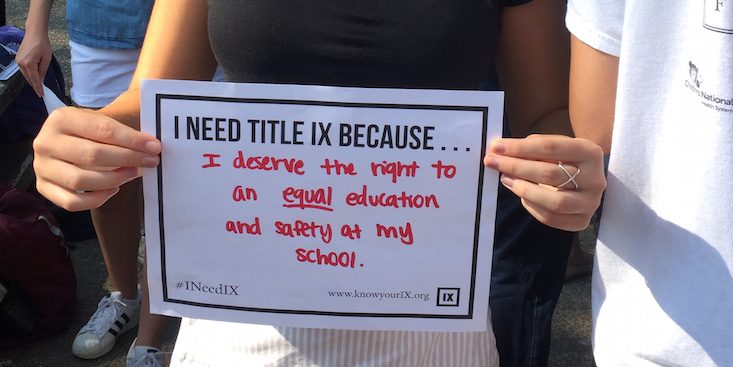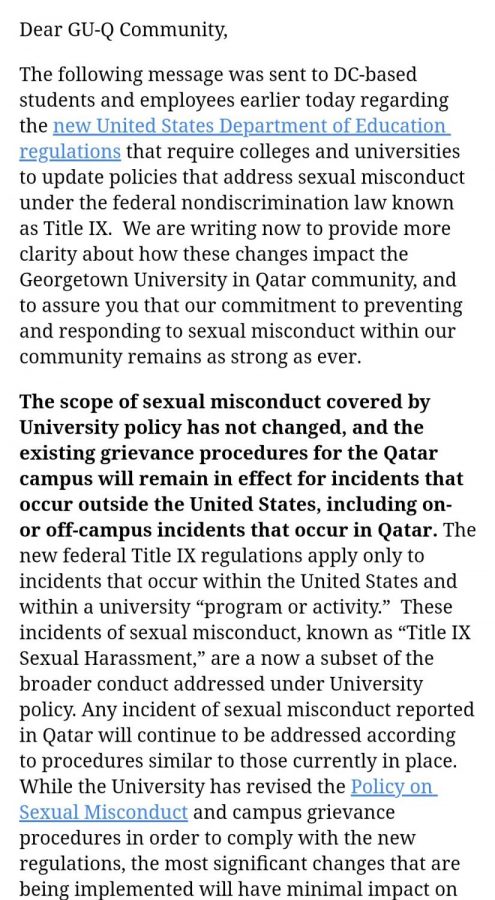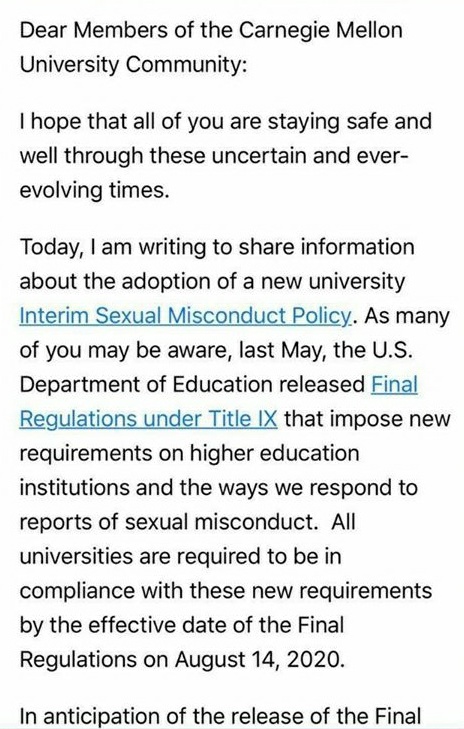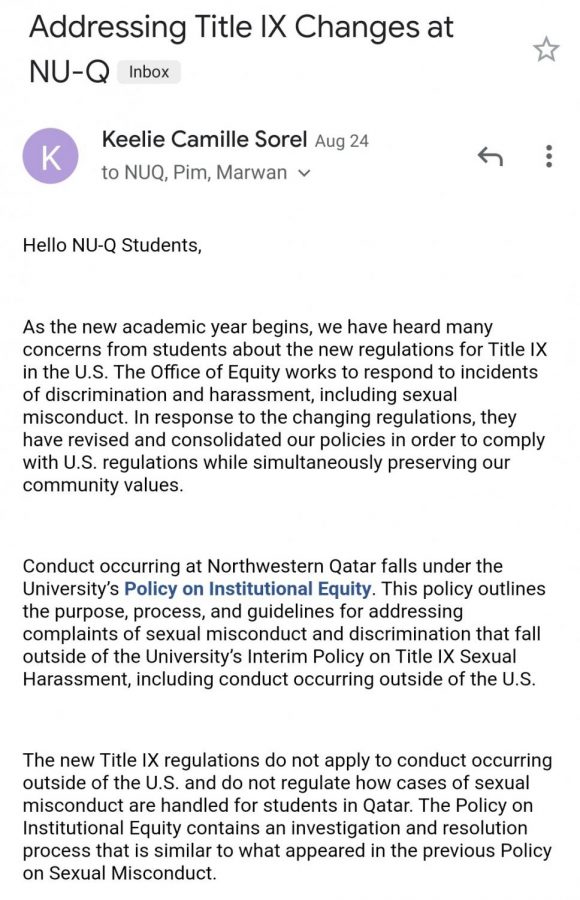New Title IX Regulations Spark Concern

Students from universities across Education City are concerned about a series of new regulations that have been implemented by the U.S. federal government to a sexual misconduct policy called Title IX.
Title IX is a U.S. federal law that prohibits discrimination on the basis of sex in all educational institutions that receive financial assistance from the U.S. government. It has been the primary legal defense for students studying in U.S. university campuses against gender and sex-based harassment and violence. On May 6, the U.S. Department of Education, under Secretary of Education Betsy DeVos, introduced significant changes to this policy. Confusion remains as to how these changes will impact overseas campuses that are affiliated with U.S. institutions, such as the universities in Education City.
The Changes
Under the new Title IX regulations, the standards for filing a complaint and being eligible to file a complaint have essentially changed. These are the new regulations that have become a cause of concern among Education City students:
- The definition of harassment under the policy has been narrowed to include only instances that are “severe, pervasive, and objectively offensive.”
- The 60-day requirement for concluding investigations has been removed.
- Schools are now required to dismiss complaints that involve incidents that occur “outside of campus-controlled buildings and/or educational activities.”
- Institutions must dismiss complaints filed against individuals who are not affiliated with the university.
- Live hearings with cross-examinations must be included as part of the investigation procedure.
- A university cannot be sued by a student, unless it is observed to show “deliberate indifference” during the investigation of a Title IX case.
Critics say these changes absolve universities of their responsibility to protect their students against sexual misconduct. The policies took effect on Aug. 14. Prior to this, many students tried for months to convince their universities to oppose the new regulations. Student survivors and advocates in the United States took action by organizing petitions and attempting to sue the Department of Education, but their efforts were blocked by federal judges. As the new regulations are now part of federal law, U.S. universities must comply with the updated policy.
However, many U.S. universities are attempting to bypass some of the new regulations by developing interim policies to address sexual misconduct behaviors that no longer fall under the Title IX definitions. Nevertheless, universities cannot circumvent all the new requirements. Even misconduct policies developed separately by universities are still subject to federal law and must abide by certain investigative procedures such as cross-examinations, now mandated as part of Title IX.
EC Students Organize Against the New Title IX Regulations
In July, a coalition of students from the U.S. campuses in Education City – Georgetown University in Qatar, Carnegie Mellon University in Qatar, Northwestern University in Qatar and Virginia Commonwealth University School of the Arts in Qatar – launched an initiative called “Know Your Title IX in EC” in response to the U.S. government’s Title IX policy changes. They created a social media campaign and drafted a statement calling attention to the new regulations. The statement was signed by 46 students from across Education City and then sent to their respective institutions through student councils or representatives from the Know Your Title IX initiative.
The members of the initiative say the new rules protect perpetrators and deter survivors from filing complaints.
According to Sara Lidetoft, a senior at GU-Q, the prospect of having cross-examinations during Title IX hearings will discourage survivors from reporting.
“You have to possibly face the perpetrator, you have to worry about retaliation, you have to worry about whether anything will come out of this process,” Lidetoft explained. “Just recounting your story once can be traumatizing enough and can be reason alone for someone to not go through with reporting.”
The Know Your Title IX initiative states that the policy change that requires schools to dismiss complaints that do not occur on “campus-controlled” settings is unfair in a development such as Education City since it is home to multiple universities. As each university has its own designated campus, communal buildings such as student housing and the HBKU Student Center are considered off-campus zones because all universities share access to them. Therefore, no single university will have full jurisdiction to investigate a Title IX complaint that occurs in these buildings, according to Nicole Heinz, the deputy Title IX coordinator at GU-Q. The new rules also apply to study abroad trips that students may take during their time in university.
This restriction to “campus-controlled” settings is also especially worrisome for Qatar Foundation students as many of them travel outside of the EC development to socialize, said Fatima Farooqui, a senior at GU-Q and a member of the Know Your Title IX in EC initiative.
“Even though we do live in Doha and the social and religious climate here does not allow for a lot of substance abuse and drug abuse to exist, to ignore it as an issue, despite knowing that people do consume alcohol at hotels and that there can be issues of sexual assault and sexual violence, is brutal,” Farooqui said.
Moreover, since EC students are allowed to cross-register for courses, cross-campus incidents may occur. In such a situation, universities should not restrict a student from filing a complaint against someone who does not belong to their own institution, said Farah Al Sharif, a senior at NU-Q.
According to Al Sharif, when she submitted a Title IX complaint in 2018, she was one of a number of other women from different EC universities to file a report against the same individual. The first person to file a report against the accused had not been from the same campus as him, but the student’s university was able to ban him from their campus, she explained. Under the new Title IX regulations, however, Al Sharif said she was unsure how such dynamics would play out today.
EC Universities Respond
Georgetown University in Qatar
GU-Q was the first EC university to communicate a response to its students regarding the Title IX changes. On Aug. 14, an email to the student body stated the new regulations would not limit the type of misconduct that could be reported for students outside the United States. The email clarified that pre-existing reporting methods at GU-Q would remain unchanged, regardless of whether an incident occurs off-campus or on-campus in Qatar. Along with this, a revised policy on sexual misconduct was attached which stated that what had previously fallen under the old Title IX policy would now be absorbed into the university’s own separate sexual misconduct policy.
“[GU-Q] will not [conduct live hearings with cross-examinations] for incidents that occur outside the United States,” said Heinz in an interview with The Daily Q. However, cross-examinations may occur if the incident occurs during a study abroad trip at Georgetown’s campus in Washington, D.C. The two parties would have to go through an adjudication process because the conduct occurred on the U.S. campus and would have to be assessed under its terms, she clarified. Heinz added that she has worked closely with the Title IX representatives from student affairs offices at other EC universities and is hopeful that universities here will collaborate to help keep cross-campus perpetrators accountable.
Farooqui is also part of a separate Title IX working group run by students, staff and faculty that advises on and raises awareness about Title IX policies in GU-Q; she said she and other students were satisfied with the university’s response.
Carnegie-Mellon University in Qatar
On Aug. 19, Renee Camerlengo, the dean of Student Affairs at CMU-Q, held a meeting with the university’s student government to discuss the Title IX changes. In this meeting, Camerlengo stated that all incidents that fell under the previous Title IX policy would now be transferred to Carnegie Mellon’s misconduct policies, which are applicable to both its U.S. and Qatar campus.
Following the meeting, Carnegie Mellon’s Provost Jim Garrett sent out an email confirming that, similar to GU-Q’s university policy, behaviors that could no longer be reported via Title IX because of the federal government’s revised definition of sexual misconduct could instead be processed under the university’s separate policy. This would be applicable for cases that occur both on and off-campus.
CMU-Q students said they were happy about their university’s response. The university had opted for a flexible sexual misconduct policy that had the capacity to address different sorts of violations, said Joud Ghalayini, a senior at CMU-Q and a member of the Know Your Title IX in EC initiative.
Virginia Commonwealth University School of the Arts in Qatar
Students from VCUarts Qatar said they are hopeful about their university’s response to their concerns about the new regulations. In a mandatory Town Hall meeting on Aug. 20, Katherine Wildman, the assistant dean of Student Affairs at VCUarts Qatar, verbally assured students that the university would not be affected by the Title IX changes and that they would draw up an independent policy to address the new regulation’s shortcomings. According to students, a formal email confirming this has not been sent yet. However, Virginia Commonwealth University in Richmond updated its website on Aug. 17 to include an interim policy, which states: “VCU remains committed to addressing incidents that do not meet the narrow standards defined under the Title IX Final Rule and in maintaining a safe and non-discriminatory learning, living, and working environment for all members of the university community.”
“I’m actually very grateful and really happy about how VCU is handling this,” said Izza Alyssa, a senior at VCUarts Qatar and a member of the Know Your Title IX in EC initiative. She pointed out that even though only three VCUarts Qatar students had signed the initiative’s statement, the administration still affirmed its message.
Texas A&M University at Qatar
On Aug. 5, TAMUQ’s Student Affairs office informed the university’s Student Government Association that they would take similar steps to those of GU-Q and CMU-Q. According to Zeina Barghouti, the vice president of TAMUQ’s Student Government Association, the university’s student affairs department clarified that the federal Title IX regulations do not apply to regions outside of the United States, which would mean that campuses in Qatar are not obliged to conduct procedures such as live hearings with cross-examinations.
Prior to this, the SGA had forwarded the Know Your Title IX in EC initiative’s concerns to TAMUQ’s Student Affairs, Barghouti said. On Aug. 5, the office responded to these concerns by stating that the decision to adopt the new regulations would be left up to TAMUQ’s SGA.
Barghouti said that she was pleased with her university’s response and that the SGA had opted out of implementing the new Title IX regulations.
In order to raise awareness about TAMUQ’s misconduct policies, the university has now taken steps to include information about these policies in their curriculum as well. Before the Title IX regulations had been announced, TAMUQ introduced a mandatory course for freshmen this fall semester called Engineering Learning Community & Student Success Seminar. According to Barghouti, this course was already supposed to include an information session about Title IX, but now the course has been expanded to also cover the latest changes to Title IX and TAMUQ’s sexual misconduct policies. The course will be delivered by Ryan McLawhon, the director of Student Affairs and Academic Services at TAMUQ, Barghouti said.
A formal announcement has yet to be made to the entire student body regarding TAMUQ’s response to the new Title IX regulations, Barghouti added.
Weill Cornell Medicine-Qatar
Weill Cornell Medicine-Qatar sent an emailed to its student council on Aug. 16 which state that the new Title IX regulations were still under discussion and the university would announce a decision soon.
Northwestern University in Qatar
According to the Office of Equity at Northwestern in Evanston, the new Title IX regulations will not apply to Northwestern’s Qatar campus; instead, NU-Q will abide by Northwestern’s Policy on Institutional Equity. The road to reach this conclusion, however, was a long and winding one for NU-Q students.
Hamad Al Fayhani, the president of NU-Q’s Student Union, said that even before the new Title IX regulations were introduced, he inherited the legacy of his predecessors: a student body that was already deeply dissatisfied with the Title IX process. In Nov. 2019, a student-led demonstration occurred in NU-Q during a community meeting with former Northwestern Provost Jonathan Holloway. Students expressed their frustration with the Title IX reporting process and raised it as one of many issues students wanted addressed by the administration. After the protest, an email was sent out by former NUQSU President Sarah Shaath informing students that she, Holloway and former NU-Q Dean Everette Dennis had discussed how to improve the Title IX policy in “the NU-Qatar context.” Despite these assurances, no actual amendments made to the policy has been communicated to NU-Q students since then.
With the memory of the demonstration still fresh in their minds, students were quick to take action. Concerns about the new Title IX policy were raised with NU-Q Student Affairs as soon as social media buzz around it grew, Al Fayhani said.
Through various email correspondences with the Office of Equity in Northwestern’s Evanston campus and NU-Q Student Affairs, the Student Union set up a Zoom meeting between the general student body and the Office of Equity for Aug. 31. On that day, the student body voiced their concerns regarding the issues they had with the new and old Title IX processes.
The meeting was attended by representatives from the Office of Equity, including Colleen Johnston, the Title IX coordinator, Amanda DaSilva, the deputy Title IX coordinator, and Kate Harrington-Rosen, the director of equity, outreach and education. Also, in attendance were NU-Q administration officials: Keelie Sorel, the director of Student Affairs, Indee Thotawattage, the student life specialist, and Pim Thukral, the chief operations manager.
The representatives from the Office of Equity clarified that the new Title IX regulations, such as mandatory cross-examinations, would not apply to areas outside the United States and that such overseas cases would fall under the university’s separate policy on sexual misconduct. However, if a student was on a journalism residency in the United States. and a case occurred there, the updated Title IX procedures would be applicable to them. In other words, NU-Q students who regularly travel to the U.S. to participate in journalism residencies, the Global Engagement Studies Institute (GESI), the Global Media Experience (GME), the Evanston Communication Exchange Program and the Student Ambassador program can potentially encounter the new Title IX regulations.
During the meeting, some students said they felt that the Title IX process had failed them as a policy because it had been practiced so poorly in NU-Q.
“We always feel like we come second to [Northwestern Evanston] when it comes to laws and rules concerning sexual harassment or discrimination,” sophomore Kim Makhlouf said.
U.S. federal courts are responsible for making sure that universities are not “deliberately indifferent” to reported Title IX cases and that the law is being practiced properly by institutions in the United States. But since NU-Q is based outside of the US, the university has been able to evade accountability, some students said.
When the Office of Equity representatives responded that it was their duty to oversee that Title IX was being practiced properly everywhere, several students argued that a majority of the student body views NU-Q as being “deliberately indifferent” to many of their cases. They added that there was little communication between the Office of Equity and NU-Q and that students often feel their concerns are not being addressed since they have no direct channels to the Evanston office.
“Everything that’s happening in Evanston in your office feels so out of reach to us,” Makhlouf said.
Some students added that they think LGBTQIA+ students are not afforded the same support and protection as their fellow classmates in Qatar.
“I feel like there is a general lack of resourcing and outreach to queer and trans students in particular, and that’s work that I am part of at this campus [Doha], as we try to figure out what an institutional response to that looks like,” Harrington-Rosen said in response.
The representatives from the Office of Equity assured students that they and NU-Q Student Affairs will work to improve outreach efforts and will involve students in addressing Title IX and sexual misconduct grievances at NU-Q. The Aug. 31 meeting would be the first of many future conversations about improving reporting procedures and results at Northwestern’s Qatar campus, they said.
“We need to keep talking. We need to keep holding space for these conversations,” Johnston said.
For the time being, any instances of sexual misconduct that occur in NU-Q will fall under the university’s independent Policy on Institutional Equity, Johnston added.
Under this policy, the process of mediation “does not include a live hearing with cross-examination; rather, parties can provide questions to the investigators that they wish to have asked of the other party or witnesses during an investigation,” she wrote in an email to the Daily Q.
Some students, however, view Northwestern’s Policy on Institutional Equity as having the same problems as the new Title IX regulations. The updated Title IX policy, for example, removes the previously placed 60-day requirement for investigations. According to the signatories of the Know Your Title IX in EC initiative’s statement, this may make the task of reporting even more difficult because it will result in unnecessarily long investigations.
Similarly, Section III (A) of NU-Q’s Policy on Institutional Equity states equity investigations should try to adhere to a 90-day timeline, but this benchmark is not guaranteed. The policy adds: “the timeline for a case may be affected by breaks in the academic calendar, availability of the parties and witnesses (including due to a leave of absence), scope of the investigation, need for interim actions, and other unforeseen or exigent circumstances.”
According to Al Sharif, the previous 60-day timeline was not always adhered to anyway. Al Sharif filed her case in December 2018 but only saw results in March 2019 after taking her case directly to Northwestern’s Evanston campus, she said.
“It was a mess,” Al Sharif added. “It was really, really long and daunting and emotionally exhausting. It got to the point where I was like, ‘I want to drop the case all together.’”
In an email to The Daily Q, Johnston stated that even though Northwestern tries to resolve cases in a prompt manner, the timeline may vary on a case-by-case basis. She confirmed that the Policy on Institutional Equity does not guarantee a resolution within 90 days.
Students Encounter the New Title IX Regulations
NU-Q students say they will continue to advocate against the new Title IX and Northwestern equity policies that they feel are unjust or inadequate. They remain hopeful that they will be able to implement meaningful change in the future.
But for students currently involved in cases, confusion— and fear—abound. One NU-Q student who filed a complaint before the revised regulations took effect said she is worried her case will be dismissed now because of, in her opinion, the new Title IX and Northwestern’s “ambiguous” definition of sexual harassment. Like Title IX, the Northwestern Policy on Institutional Equity has been updated to state that in order for a harassment case to proceed, the harassment must first be judged as “sufficiently severe or pervasive” by the Office of Equity.
“The reason that I did not want to file a report in the first place was because I was scared of it not seeming “severe” enough,” said the student, who requested anonymity because her case is ongoing and she is not allowed to disclose its details. She added that she is afraid her decision to report will be all for naught.
For Al Sharif, the new regulations will only increase students’ uncertainty in already uncertain times.
“You step down from what was already not the sturdiest ground onto even less sturdy ground,” she said, adding that NU-Q must do more to help its students feel safe and supported. “I think that a university is nothing without its students. So, if you’re not protecting your students then who are you protecting?”















